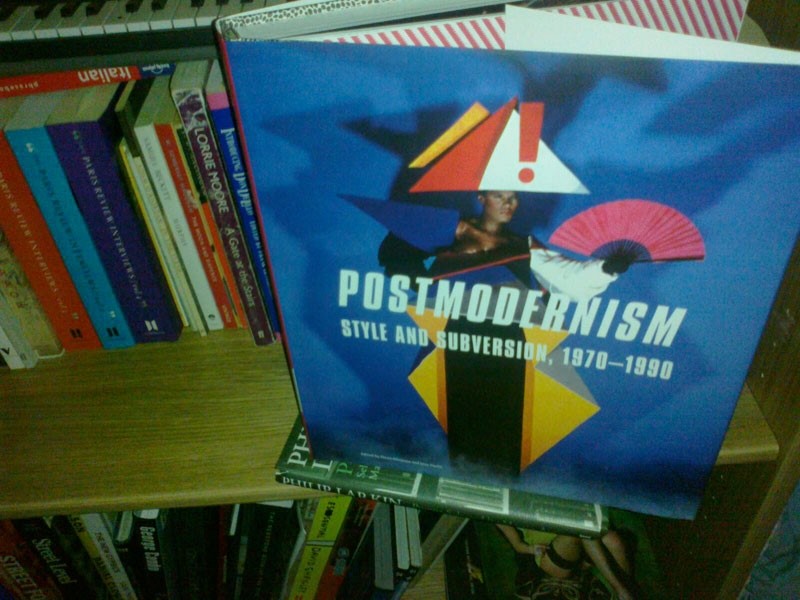"Tomorrow’s Been Cancelled Due to Lack of Interest", reads the title to Derek Jarmen’s chapter in Postmodernism. Taken from his 1987 film The Last of England, the phrase serves as a tagline for the era, which as the V&A’s exhibition showed so
"Tomorrow’s Been Cancelled Due to Lack of Interest", reads the title to Derek Jarman’s chapter in Postmodernism. Taken from his 1987 film The Last of England, the phrase serves as a tagline for the era, which as the V&A’s exhibition showed so precisely, spanned a period of moral subversion into all-powerful and hedonistic capitalism. Sadly the museum closed its doors on the show last week, but from its gift shop (which was cunningly integrated into the exhibit by a glaring neon arrow at the exit, suggestive of the money-making at the end of the Postmodernist rainbow) comes its accompanying, and super-hot new book.
Only the dulcet tones of Laurie Anderson’s voice-encoder will do when reading this and a repeated playing of O Superman is obligatory as you make your way into the bold pictorial passage set through 20 years of groundbreaking design, art, architecture, fashion, furniture and music. Looks are of the utmost importance – from the Grace Jones-emblazoned fly-sleeve to the trippy geometic design of the inside cover. But don’t let the vast aesthetic proportions fool you into thinking that this isn’t a book of strong, theoretical clout.
Happily the V&A Press have applied their visual and academic know-how to create something that artfully straddles both. Yes there are pages devoted to tea-pot design, but not without a witty explanation of the quixotic approach of a Sottsass and the rest of the Memphis group. And that really is the least of the book’s achievements…
"The point of Postmodernism, Style and Subversion, 1970-1990 is to contextualise the popular culture that we have taken for granted and explain the mechanics behind it."
Doing justice to something of this scope is almost impossible. Personal highlights include: a comprehensive insight into the works of Robert Venturi and Denise Scott-Brown; an entire chapter devoted to the otherworldly singing-voice of Klaus Nomi; image after image of Grace Jones in various guises (including a "whited-up" cover for The Face) and an analytical deconstruction of the best of your eighties record collection.
The point of Postmodernism, Style and Subversion, 1970-1990 is to contextualise the popular culture that we have taken for granted and explain the mechanics behind it. This isn’t just suggested reading, it is mandatory and will have you seeing the world in a whole new light by the time you reach its back cover.
Here’s three more you’ll like if you like this one:
Postmodernism: A Very Short Introduction by Christopher Butler – Less Kraftwerk and more Walter Abish. Quite simply the best and quickest way to get to grips with postmodernism. It’s the simplicity of tone here that really shows Butler’s unparalleled ability to cut through the crap.
Money: A Suicide Note by Martin Amis – The archetypal postmodernist novel, following Mr. John Self in his pursuit of sex, inebriation and hard cash. Quotations from this Amis classic were painted along the walls of the exhibition.
Atlas Shrugged by Ayn Rand – Adam Curtis recently attributed this book with having promoted mass-capitalism and pioneered a digital fascination across America. Like Money, a modern classic that deserves a re-read in light of the V&A’s new book.
Postmodernism: Style and Subversion, 1970-1990 is published by the V&A press and is available from all major online retailers, as well as art shops and selected book shops internationally.
